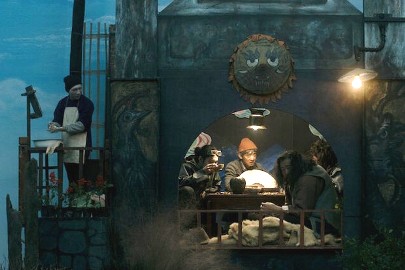 The fictional account of a Chinese opera troupe covers, in epic and satiric style, the course of Chinese history from the 1920s through the 1970s.
The fictional account of a Chinese opera troupe covers, in epic and satiric style, the course of Chinese history from the 1920s through the 1970s.
A friend once teased me, calling me “the boy who cried masterpiece,” because of my over-fondness for that word. But I’m going to use that word again, having recently watched the latest film from Chinese director Qiu Jiongjiong, called A New Old Play. It’s a stunning 3-hour epic drama, with satirical elements, about a fictional Chinese opera troupe, from the 1920s through the early 1970s.
We start with a strange framing device. Two figures emerge from behind a hill, one of them making a sound like a horse, the other like an ox, and pedaling a raggedy looking carriage decked with lights. They are ancient messengers from the underworld, the land of the dead, and they’re here to transport a well-known opera performer named Qiu Fu, and played by Yi Sicheng, to the afterlife after his recent death. Qiu tries to argue with the spirits, but in the end he has no choice. He has to travel with them, first through a shadowy netherworld and eventually across a river to his final home. While wandering through the netherworld, he reminisces about his life and the history of his opera troupe in extended flashbacks which take up the bulk of the film.
The orphaned son of a famous actor, Qiu tags along with his father’s former Sichuan opera company in the 1920s. They laugh at him and try to kick him out, but the master of the troupe sees something in him, and he’s given training. This is an innovative group—China having recently become a republic—that seeks to modernize the art, with one of the key innovations being allowing women to play female characters. We follow Qiu’s story, as a youth, then a young man, to success as the company’s number one clown. There are also many other characters who are granted a point of view in the story: it’s a rich fabric of interesting relationships. Crucially, the personal stories are set against the dramatic stages of 20th century Chinese history.
The director, Qiu, has an eye for the telling detail. For this story, he employs theatrical devices to create a kind of magical realist effect. We feel the intense historical reality while recognizing the artificiality of the form. The sets are obviously painted sets, and the many props and other production details are clearly the kind you might see on a stage, but brought out to beautiful effect by the camera and its many tracking shots across the scenes that are presented for maximum effect. Almost every sequence, every shot in the movie contains something to stimulate, provoke, or puzzle the viewer. The historical reality is conveyed through the slightest means. When Mao takes over the country, the new training of the theater company to conform to party doctrine is darkly comical, as we can see its effect on the already jaded performers. The film’s title comes to mind here: A New Old Play. It’s like the lyric from that song by The Who: “Meet the new boss, same as the old boss.”
The film doesn’t flinch from recalling the tragedies of Chinese history. It covers the famine that killed millions in the ‘50s. It covers the so-called Cultural Revolution in the ‘60s, with its stupid scapegoating of an entire generation. We see a prisoner in one of the work camps building a brick enclosure that will eventually entrap him. But the symbolism goes even beyond politics. Those entering the underworld must first drink from a stream of forgetfulness. Forgetting is the ultimate price. But this film, this masterpiece, A New Old Play, won’t let us forget.

This film features real people playing themselves in a drama about a young rodeo hotshot whose career has been cut short by a head...

Ruben Őstlund’s latest film savagely satirizes establishment complacency and self-regard, using the theme of modern art to reflect on the porous boundaries between civilization...

A married woman visits three friends in the city, and we are inspired to consider what is the nature of happiness for women in...